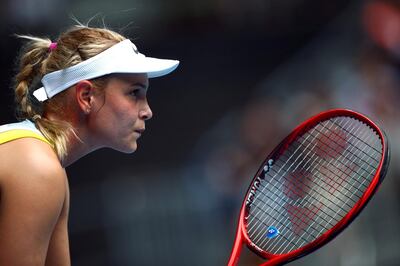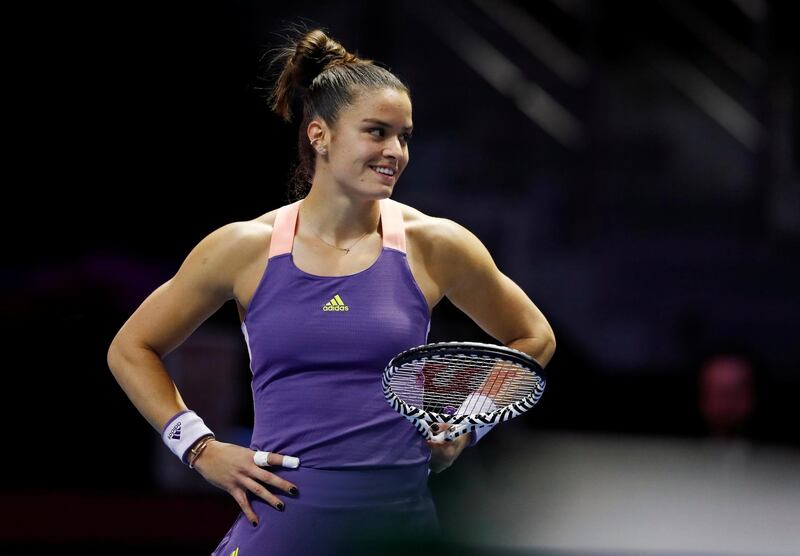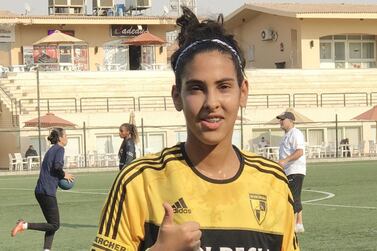The fate of the WTA tennis tour has been so uncertain during this pandemic that world No 20 Maria Sakkari was planning on swapping her tennis shoes for running spikes to compete in the 100m sprint at the Greek national championships this week.
Instead, she is in Palermo for tennis’ long-awaited return, with the WTA staging its first official tournament in five months and looking to salvage whatever is left of this coronavirus-interrupted season.
Sakkari, seeded No 3 on the clay of southern Italy, is set to play her opening round on Monday against Kristyna Pliskova. Without spikes or starting blocks, she says she can run the 100m dash in 12.7 seconds. Her fitness coach was confident that had she trained, she would have made the final at Nationals.
“I love my sport and I’m never going to change it for anything else. But you know [I had missed] that competition feeling,” the affable Greek said on Sunday.
The general sentiment in Palermo is that everyone is happy to finally have an opportunity to play a competitive tennis tournament following a lengthy hiatus.
Team Sakkari, ready to restart the season! pic.twitter.com/XbLwpPUR05
— Jimmie48 Photography (@JJlovesTennis) August 2, 2020
But if you spend some time talking to the players, across both the women’s and men’s tours, you’ll soon realise there isn’t much else they collectively agree upon.
A few days ago, world No 1 Ashleigh Barty ruled herself out of the US Open later this month due to concerns over the high number of daily cases of Covid-19 in the United States. On Sunday her fellow Australian, Nick Kyrgios, followed suit.
World No 24 Donna Vekic, who is a member of the WTA Player Council, doesn’t share Barty’s fears over the virus but has other concerns, including the quarantine period she might need to abide by upon her return to Europe after the US Open. Two weeks of isolation would mean Vekic would have to skip the clay events in Madrid and Rome ahead of the rescheduled French Open at the end of September. “That would suck,” said the 24-year-old Croatian.
So no concerns over the virus? “No I’m not worried about that, I’m just more worried about different kinds of scenarios of what’s going to happen if someone does test positive in New York, what happens then? I think USTA hasn’t been able to answer a lot of the questions, that’s more my concern,” she added.
The main question the US Tennis Association has yet to answer is whether the US Open (and the Western & Southern Open relocated from Cincinnati to New York) will happen at all.
Sakkari said the delay by the US Open has left "every single player" unhappy, "because it’s 20 days away from Cincinnati starting."
Still, Sakkari is grateful there are tournaments back on the calendar, despite the adjustments the players have to make to compete.
Tennis’ new normal involves mandatory masks and visors, virtual press conferences, a one-person limit on each player’s onsite entourage (for WTA events), and a recommendation from the WTA Tour that players stick to their rooms when they are not at the tournament venue.
Flying for tennis players is as routine as having breakfast, but the coronavirus changed the entire world’s relationship with airports and airplanes.
“I wouldn’t say I had anxiety, it’s just that I felt like I kept my distance from people so well so I thought, ‘OK, I did my part really well and now if I get on a plane and I get this, that’s going to be some real bad luck’,” said Palermo top seed Petra Martic, on how she felt about flying again.
Petra Martic having a remote chat with the media in Palermo. pic.twitter.com/u7y6WZJgLT
— Jimmie48 Photography (@JJlovesTennis) August 1, 2020
The field in Palermo is almost entirely comprised of Europeans, some of which have enjoyed a somewhat normal life in recent weeks due to the easing of lockdown restrictions in their home country.
Estonian No 4 seed Anett Kontaveit said she "freaked out" when she almost left her hotel room without a mask on. She is simply not used to wearing one back home.
“Life was pretty normal in Estonia. We didn't wear masks or keep distance,” she explained. “So it's definitely very different and it will take a few days for me to get used to it. It did intimidate me a little bit when I left Estonia and I knew about all the protocols that we had to do here. It was a terrifying thought in the beginning, but it's sort of starting to feel normal now.”
Another adjustment for players is having just one member of their team joining them on site. While lower-ranked players cannot afford to travel with a large entourage, higher-ranked ones typically go to events with a coach, a fitness trainer and a physio, at the very least. Some also have family members tag along, as well as agents and PR managers.
“I just think it’s a little bit frustrating not being able to have my full team with me onsite, that’s been challenging,” conceded Vekic.
As tennis grapples with a return to competitive action it still has to deal with the realities of the coronavirus pandemic. An unnamed player in Palermo has already tested positive for the virus and was immediately withdrawn from the tournament.
Players praised organisers for how they have handled the situation but it highlighted the risk they and staff face, which will only get more complicated at larger events that include competitors from both the men’s and women’s tours.
Opinions seem varied on how strict organisers need to be when enforcing the rules that would keep the 'bubble' secure during tournaments, and not everyone feels like they can trust their peers and their team members to follow protocols.
"We all depend on each other and I don't want to pay for someone else's mistake, and I think that's fair; whoever doesn't follow the rules should be punished accordingly," said Martic.
How confident is she that everyone will stick to the Covid-19 protocols? "I’m not confident at all,” Martic concedes with a laugh.
“I know I’m going to follow the rules and that’s all I can control. I really hope that everybody else missed tennis and I hope this was a long enough warning that if we’re not being smart and disciplined about it, we’re going to go back to cooking and staying home and what we did the whole year basically. So if that’s not a good enough reason or motivation for people to follow the rules then I really don’t know what is. Let’s hope for the best.”
Sakkari said she is minimising her time onsite in Palermo, and is mostly staying in her hotel room. She says that players have not been explicitly instructed to stay put, but that it was more of a recommendation than a rule.
Vekic, who has shared photos on social media of herself sightseeing and dining out in Sicily, seems to be taking a more relaxed approach when it comes to her off-court activity.
“I have a feeling that in New York it will be a real bubble. Here [in Palermo] they talk about us being in a bubble but it’s not at all,” she said.
“I don’t want to pretend that I’m locked in the room the whole day when I’m not. I went to dinner in the city. For sure we’re being careful and not being close to people but I’m not locked in the room and 90 per cent of the players aren’t.
“I hope in New York there will actually be fines and if everyone respects that and it makes sense then I’m all for it, but if the rules are contradicting each other, then it makes no sense.”
Richard Gasquet, who was competing in an exhibition event in the South of France over the weekend, called out the WTA for not dedicating an entire hotel for the players and staff in Italy.
"It is an absolute scandal that the players are in the same hotel as the tourists in Palermo," the Frenchman told L'Equipe . "I don't know how the WTA can accept such a thing. If you stage a tournament, it's because the hotel is 100 per cent reserved for players and their staff. If you can't, you cancel the tournament."
Gasquet has a point, but it is not realistic for a small International-level tournament (the lowest tier on the WTA circuit) to have a budget that would allow them to book an entire hotel. Some players have been acting like tourists themselves.
Gasquet plans on going to New York if the US Open is officially green-lit but urges the USTA to perform rigorous testing and to enforce a strict lockdown on players.
He acknowledges that the thought of spending weeks confined to a hotel room when he's not at the tennis venue is not ideal, but adds, "who is living a pleasant life at this moment?"
Gasquet's perspective will not necessarily be shared by everyone. We have already seen players break self-isolation vows, hit nightclubs and globetrot their way from one exhibition to another.
While we’re yet to hear from the USTA about rule enforcement and consequences for those who break them, the ATP have amended their code of conduct to cover violations of Covid-19 measures. The WTA, who initially said they wouldn’t introduce fines for such violations, have adjusted their stance and will now evaluate offenders on a case-by-case basis, potentially withdrawing a player from a tournament if necessary.

“I think it’s just important to have some sort of common sense,” says Vekic. “I don’t think the players are going to be going out in nightclubs and partying [in New York]. If you want to go outside for a walk, I think it’s fine and normal.
“It’s going to be really tough and if we all have to, for the next few months, just stay in the room and go onsite, I think everyone will go insane to be honest.”
There are still many unknowns surrounding the return of tennis and Palermo is the start of what could be a very short revival. Even if all the tournaments currently on the calendar end up taking place, we can still expect withdrawals due to travel restrictions, positive Covid-19 tests, or for personal reasons like Barty and Kyrgios. Will we get to a point where a Grand Slam field is so depleted that it shouldn't be held?
“I don’t think anything is normal these days, whether it’s a Grand Slam or any other profession in the world, nothing is back to normal yet,” said the 15th-ranked Martic.
“And I don’t think we can or should expect tennis to be with full draws, or not being regional and having all the players everywhere in the world, but we’re trying our best to bring the sport back and to make it possible, and we should be grateful that it can happen in the first place.
“Let’s not look for perfection and let’s really be grateful for what we have right now.”
Sound advice from Croatia’s No 1.







